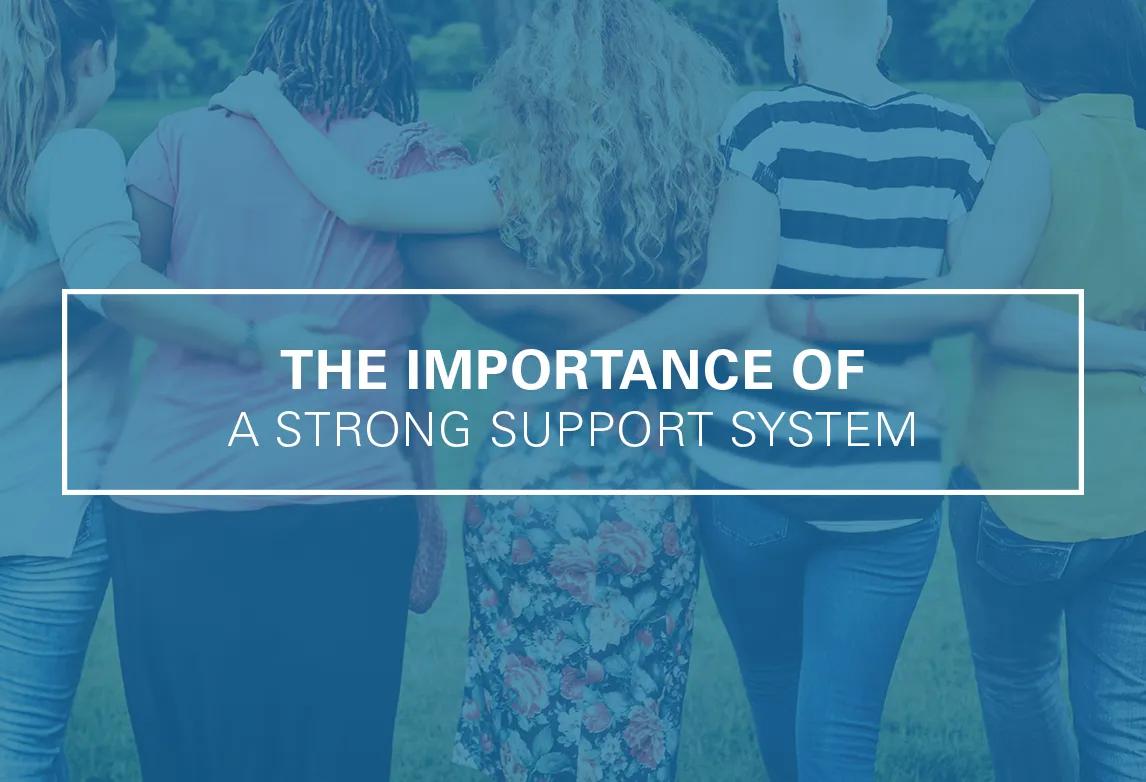Table of contents
The Importance of a Strong Support System

Table of Contents
Think back. When was the last time you asked for advice or confided in someone? How did that conversation affect you? Perhaps you felt comforted, or more capable of solving the problem you needed to address.
It’s important to surround yourself with positive and trustworthy people who can walk through your triumphs and struggles with you. They should be encouraging, care about your life goals, and have your best interests at heart. When you have that kind of support system, you’ll be more likely to reach your goals and persevere through hardship. But these relationships must be maintained to reach their full benefit.
The Benefits of Having a Support System
Having a social support system – a network of strong relationships – has a tremendous effect on one’s health. Science has shown that people with supportive people in their lives live longer, have better health, and report having higher well-being.1
Here are some steps you can take to recognize and grow your supportive relationships.
How To Identify Your Support System
To identify the supportive people in your life, consider:
- How do you feel when you talk to this person?
- Do they take your feelings and needs into account?
- Is the advice they give based on your well-being?
- Do they tell you tough truths when you need to hear them?
- Do they celebrate your triumphs with you?
- Do they encourage you to be better than you were yesterday?
- Have they opened possibilities for you that you didn’t realize existed?
Ask yourself these questions about your friends, coworkers, and the people who regularly advise you. You’ll start to see a pattern emerge for each person, and you might discover that some people are more supportive than others. This doesn’t mean you should abandon your other connections—it just means you should put extra effort into the ones who do support you.
Your supporters don’t have to be perfect—no one is. But they should have qualities you admire, knowledge that is beneficial to you, the ability to listen and understand, and empathy. These traits are key to great supporters.
How to Sustain Your Support System
Support is a two-way street. Once you identify the main supporters in your life, do your best to build those relationships. Connect with them regularly and keep them updated about your life. Accept invitations to social events with them and reciprocate those invitations as well.
Invite them into your decisions and explain your reasoning—then ask for their honest opinion. Be open to feedback, even if it’s not always what you want to hear. The best supporters will tell you tough truths and help you see your options from different perspectives.
It’s also important to be open to advice. Your support system can’t help you if you don’t consider what they have to say. When making big decisions, talk to members of your support system who have knowledge in areas where you’re unfamiliar.
For example, if you’re thinking about making a substantial financial purchase, you should talk to someone with expertise in financial matters. We all have unique knowledge based on our own life experiences. You can use the knowledge of your supporters to make better decisions.
It’s critical be available when you’re needed as well. Be a good listener and confidant. Be there for those in your support system when things are difficult.
How to Grow Your Support System
For some, it might be simple to identify and nurture the supportive relationships in their life, while others may find it difficult to grow their social support system. Building new relationships requires putting yourself out there — sometimes beyond one’s comfort zone.
If you’re a student, school can be a great way to discover new friendships. You may also find there are local clubs – like book clubs, hiking clubs, or gaming clubs – that are ripe with new people to meet.
Volunteering at a community organization can connect you to others with shared values and interests. Find a cause you’re passionate about and get involved with it.
You can also try taking up a new sport or joining a gym. Not only will you improve your physical and mental health, but you may also build new friendships through a common interest.
Life is better when you don’t have to go it alone. That’s why you should work to identify the people in your life who support you and focus on strengthening those relationships. When you do, you may find that you can go farther than you ever thought possible on your own.
Request Information
Talk with us. Start your journey.
Complete this form and we'll call you to explore options at UMA and answer your questions. We'll also email you info on how to get started. We're with you at every step!
Request Information
Talk with us. Start your journey.
Complete this form and we'll call you to explore options at UMA and answer your questions. We'll also email you info on how to get started. We're with you at every step!
About the Author
 Christina DeBusk
Christina DeBuskChristina DeBusk is a freelance writer who has been providing health and wellness content to healthcare organizations such as the American Chiropractic Association and International Sports Sciences Association (ISSA) since 2011. She obtained her Bachelor of Science in Sociology from Central Michigan University, minoring in psychology. She has also earned several ISSA certifications, including Certified Personal Trainer and Certified Nutrition Specialist, achieving the status of Elite Trainer.
Related Content


